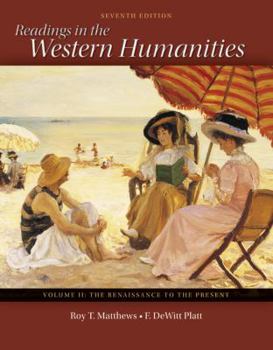Readings in the Western Humanities Volume 2
Volume 2 of "Readings in the Western Humanities" presents a wide array of primary source readings ranging from the Renaissance to the present day.. This description may be from another edition of this product.
Format:Paperback
Language:English
ISBN:0077338499
ISBN13:9780077338497
Release Date:January 2010
Publisher:McGraw-Hill Humanities/Social Sciences/Langua
Length:384 Pages
Weight:1.75 lbs.
Dimensions:0.7" x 8.4" x 10.7"
Customer Reviews
2 ratings
So Very Pleased
Published by Thriftbooks.com User , 15 years ago
I've purchased other text books online and though the quality has been good, the shipping has been INCREDIBLY SLOW! 21 days with my last purchase...However, with this purchase, I not only received a book in perfect condition, I received it within 3 business days...I am so very pleased!!! I will definitely purchase from you again.
Readings in the Western Humanities through the Renaissance
Published by Thriftbooks.com User , 20 years ago
This is the fifth edition of "Readings in the Western Humanities, Volume I: Beginnings Through the Renaissance," which complements the first volume of the fifth edition of the textbook "The Western Humanities" by Roy T. Matthews and F. Dewitt Platt, which covers ancient Mesopotamia through the Renaissance (with Volume II doing the Renaissance through the 20th century, leaving it up to professors and institutions to decide whether the Renaissance gets covered first semester or second). When I took history classes in school I always thought it would be nice to read some of the great works of literature and famous speeches from history, because those are primary documents representing the times. Now I find out that in Humanities you can combine history and literature and have been looking at textbooks for a two-semester Humanities course. What attracted me to the Matthews and Platt volumes were these supplemental reading texts (and the CDs with representative music).In terms of the selections included in this first reading the strategy is clearly to cover the basic texts. If you are only going to do one Greek tragedy it should be "Oedipus the King" by Sophocles and that is what is here, as is the section on Aristotle's "Poetics" that talks about the key elements of tragedy. Instead of choosing between Homer's "Iliad" and "Odyssey," they provide selections from both. The book begins with the beginnings of Western literature, with selections from "The Code of Hammurabi" and "The Epic of Gilgamesh." The Romans are covered in a bit more depth than the ancient Greeks but the section on the World of Islam is comparable to that of Judaism and the Rise of Christianity, which is certainly relevant in these times. You will find selections from St. Augustine, St. Thomas Aquinas, Dantes's "Inferno," Petrarch, Giovanni Boccaccio, Geoffrey Chaucer, Baldassare Castiglione, and Niccolo Machiavelli. The result is a solid coverage of the West's literary and philosophical heritage, from "Beowulf" to the "Song of Roland." Apparently some of changes were in response to the requests of reviewers and those additions noted in the preface are certainly welcome, even at the expense of "Lysistrata." Matthews and Platt note that the most substantive change in these readings are the footnotes that provide annotations for identifying difficult proper names, place names, titles, terms, ideas, quotations, and allusions in each selection that are either vital to a work's meaning or useful to know. Having taken considerable pride in doing this for the collection of great speeches that I co-edited many years ago, I certainly applaud this effort (although half the fun of teaching is standing up in front of your students and explaining all about Tiresias the blind prophet of Thebes and how Dante organized the circles of Hell. Now all I have to do is get these classes on the schedule so I can actually use these books.





